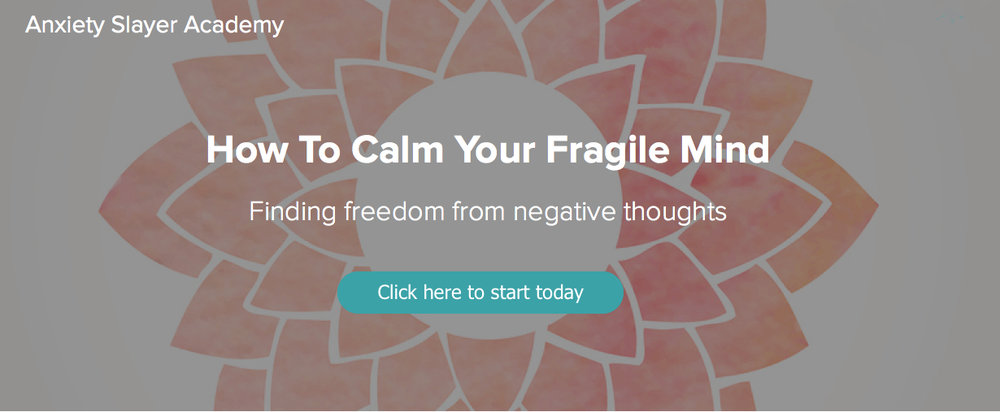When we fear our repetitive thoughts

Photo credit: make a note
In this week's podcast we are responding to a question asking for strategies for dealing with fearfulness around repetitive thoughts and constantly having anxiety on your mind.
Many thanks for your fantastic podcasts. I wondered if, at some point, you might be able to touch upon some strategies for dealing with fearfulness around repetitive thoughts/inward thinking, constantly having anxiety on your mind.
I guess my anxiety has always been fairly thought-based in nature, often causing my mind to turn sharply inwards. It feels like I have a tentacle-like focus on myself, high self-awareness and an almost obsessive desire to think about myself and the anxiety.
I'd love to be able to come to terms with this symptom but keep coming up against fearful thoughts such as ‘what if I can never have normal, outward thought’ or ‘what if I get trapped inside my own head forever’ or ‘oh no, I'm thinking about it again!’
It's got to the point that, each time I wake and think about anxiety/anxious thoughts I get a sharp stab of fear which can often trigger an uneasy relationship with my thoughts that lasts for much of the day.
So any podcasts about how to re-establish a positive and healthy relationship towards thoughts (even repetitive and inward ones) would be much appreciated.
For in-depth guidance on this issue please see our How to Calm Your Fragile Mind course at the NEW Anxiety Slayer Academy.
Points covered in the podcast:
Bad thoughts create more bad thoughts
The mind forms grooves from our habitual thinking. If our thinking is affected by anxiety our thoughts will fall into those grooves.
It can be changed but it takes some work and persistence
Strategies that help
1. Know that you are not your thoughts
You have thoughts, lots of them, usually with a few particularly unpleasant ones. But they are not you. Beyond your mind is your intelligence, which you can start using to direct your mind and then, according to Ayurveda, is the real you: the soul, which is eternal and full of knowledge and happiness.
It's helpful to reflect on this. "I am not my mind, or my body, or these awful thoughts."
When we start speaking of "my mind," we are defining the mind as an object that belongs to us, like a coat or a pen. It is not us. Knowing this gives us some power over our mind and thoughts and the space to learn how to use and direct the mind.
2. Get some emotional distance
You are talking about your mind turning inward on itself. That's a great understanding. The mind is our thinking apparatus and it easily gets stuck in its own bad press, negative predictions, or just outright panic and looping mess.
In the podcast we share the example of a mother dealing with a toddler who's having a tantrum. We can benefit from regarding our mind in a similar way. It way be distrubed and it may be giving us a lot of drama, but it isn't in charge. If we let a three year old rule our home it will be chaos. It's the same with the mind it needs direction.
You can even talk to your mind. "I can see you're disturbed but can we just do something else for a few minutes. How about a walk? See if we both feel better?" Be firm and add humour. It difuses the power of unwanted thoughts. It gives some distance. It stops you being in your thoughts. And that brings perspective which then gives you some breathing space to take action.
3. Practice mindful redirection
Mindful walking, mindful movement like yoga, Qigong, or Tai Chi. Practices that release stress from your body and help your mind form new grooves under your direction.
You can't stop the mind thinking. Our thoughts are linked to our breath. As long as we breath, we think.But the more calmly we breathe, the more calmly we can think.
4. Don't blame yourself
Don't think of your self as stupid or weak, or think in terms of what's wrong with you. It's not just you. Everyone's mind has the potential to do this and most people are living with the same struggle to a greater or lesser degree.
There will be days that are easier than others. That's natural.
Notice what helps and keep doing it. It might be creative journaling - a good way to stop the mind turning in on itself and employ some gentle, immersive, external focus. Inspiring reading while being as present as you can. Comedy. Happy music. Cooking anxiety healing meals with your attention fully focused.
Eating with gratitude, laughing with friends, breathing in nature. All these things are expansive and settling to the mind.
When we start to detach from the intense thoughts and fill our mind with good thoughts it will start to settle. With some time and application you can feel much better. But it's important to understand that it is the nature of the mind to do this. So don't think you will be cured of disturbance once you improve. My mind is still horribly disturbed and disturbing sometimes, but it is so much better than it used to be. I have much more control over it and I've learned to understand it more. But we still have some rough spells together. That's how it is.
We have to keep steering, keep directing, keep making good choices in avoiding what we know disturbs the mind and choosing more of what helps and heals it.
Listen to the podcast here:
If your browser isn't showing the podcast player please listen here
What's next?

You can find out more in our How to Heal Your Fragile Mind Course where we cover this in more depth and have some guided exercises for calming unwelcome thoughts and helping you observe your mind without getting caught up in it's energy.
